Best WordPress Security Plugins to Protect Your Website: A Comprehensive Guide

Website security is paramount in the WordPress ecosystem due to the platform's widespread usage and open-source nature. As the most popular content management system (CMS) globally, WordPress powers millions of websites, making it an attractive target for hackers and malicious actors.
Ensuring the security of your WordPress website is crucial to protect sensitive data, maintain the integrity of your content, and safeguard your reputation online. Without robust security measures in place, websites are vulnerable to various cyber threats, including malware infections, data breaches, and unauthorized access.
WordPress websites are exposed to a wide range of security threats, including malware infections, brute force attacks, SQL injection, cross-site scripting (XSS), and phishing attempts. Hackers exploit vulnerabilities in WordPress core files, themes, and plugins to gain unauthorized access to websites, steal sensitive information, deface web pages, or distribute malicious content.
Additionally, outdated software, weak passwords, and insecure hosting environments further exacerbate the risk of breaches. As cyber threats continue to evolve, website owners must remain vigilant and implement robust security to protect their WordPress sites from potential attacks.
This article offers WordPress website owners a comprehensive guide to enhancing their website security through the use of security plugins. With the proliferation of cyber threats targeting WordPress sites, selecting the right security plugin is essential for mitigating risks and safeguarding sensitive data.
This guide will explore the importance of website security, the various threats faced by WordPress, and the role of security plugins in defending against cyber attacks. By providing in-depth analysis, recommendations, and practical tips, this article aims to empower WordPress users to strengthen their website security posture effectively.
Security Plugins: Understanding WordPress Security
WordPress websites are susceptible to various common vulnerabilities that attackers can exploit. These vulnerabilities often arise from outdated software, insecure themes or plugins, weak passwords, and inadequate server configurations.
Examples include SQL injection, where attackers inject malicious code into WordPress databases to gain unauthorized access, and cross-site scripting (XSS), which allows attackers to execute malicious scripts on the user's browser.
Additionally, insecure file permissions, lack of HTTPS encryption, and neglecting regular updates further expose WordPress sites to potential security risks. Understanding these vulnerabilities is essential for website owners to implement proactive measures and mitigate the risk of exploitation.
The consequences of security breaches for website owners can be severe and far-reaching. A successful security breach can result in the loss or theft of sensitive data, such as user credentials, personal information, and financial data, leading to legal and regulatory implications.
Furthermore, breaches can damage a website's reputation and erode user trust, resulting in loss of credibility and potential revenue. Website downtime, defacement, or suspension by hosting providers due to security issues can disrupt business operations and incur significant financial losses.
Moreover, recovering from a breach can be time-consuming, costly, and challenging, requiring thorough investigation, cleanup, and restoration efforts. Overall, the impact of breaches underscores the importance of prioritizing security to safeguard against potential risks.
Websites need proactive measures to prevent breaches and protect against potential threats. By implementing robust security practices, such as regularly updating WordPress core, themes, and plugins, enforcing strong password policies, and implementing security protocols like HTTPS encryption, website owners can reduce the risk of exploitation and enhance their website's resilience against cyber attacks.
Additionally, conducting regular security audits, monitoring website activity, and implementing security plugins can help detect and mitigate vulnerabilities before they can be exploited. Proactive measures not only enhance security but also provide peace of mind for website owners, ensuring the integrity and confidentiality of their online assets.
The Role of Security Plugins
WordPress security plugins are software tools specifically designed to enhance WordPress's security by detecting, preventing, and mitigating various security threats. These plugins offer a wide range of features and functionalities, including malware scanning, firewall protection, secure login, and vulnerability assessments.
By integrating seamlessly with WordPress, security plugins actively monitor website activity, analyze potential risks, and provide alerts or notifications to website owners. Additionally, security plugins often offer automated security, such as malware removal and brute force attack prevention, to proactively safeguard websites against cyber threats.
Using security plugins provides numerous benefits for website protection in the WordPress ecosystem. Firstly, security plugins offer an additional layer of defense against common security threats, such as malware infections, brute force attacks, and unauthorized access attempts.
These plugins enhance security by continuously monitoring website activity, detecting potential vulnerabilities, and implementing proactive security to mitigate risks. Furthermore, security plugins streamline the process of managing security, offering user-friendly interfaces, automated security scans, and comprehensive security reports.
By utilizing security plugins, website owners can effectively strengthen their website's security posture and protect against potential cyber-attacks.
When choosing a security plugin for WordPress, several factors should be considered to ensure optimal website protection:
- Compatibility with the latest version of WordPress and other installed plugins is essential to ensure seamless integration and functionality.
- Consider the range of features offered by the security plugin, including malware scanning, firewall protection, and login security, to address specific security needs.
- Evaluate the security plugin developer's reputation and reliability, as well as the frequency of updates and customer support availability.
- Consider the scalability and flexibility of the security plugin to accommodate future growth and evolving security requirements.
Essential Features of WordPress Security Plugins
When selecting a WordPress security plugin, it's crucial to consider several key features to ensure comprehensive website protection:
- Robust malware scanning capabilities are essential for detecting and removing malicious code from WordPress files and databases.
- Firewall protection helps prevent unauthorized access and block malicious traffic from compromising security.
- Features such as login security, which includes two-factor authentication and login attempt monitoring, help prevent brute force attacks and unauthorized access to user accounts.
Other essential features to look for include file integrity monitoring, security audits, and website hardening measures to fortify WordPress websites against potential threats.
By prioritizing security plugins with these critical features, website owners can effectively enhance their security posture and protect against a wide range of cyber threats.
Malware scanning is a fundamental feature of WordPress security plugins that help identify and remove malicious code injected into WordPress files and databases. By conducting regular malware scans, security plugins can detect malware infections, viruses, and other threats, preventing them from compromising the website's integrity.
Firewall protection is another critical feature that acts as a barrier between the website and potential attackers, blocking malicious traffic and preventing unauthorized access to sensitive data.
Additionally, security features, such as two-factor authentication and login attempt monitoring, help prevent brute force attacks by adding an extra layer of verification to user login processes. By implementing these features, security plugins help fortify WordPress websites against common vulnerabilities and mitigate the risk of breaches.
Regular updates and support are vital considerations when selecting a WordPress security plugin to ensure ongoing effectiveness and reliability. Security vulnerabilities are continually evolving, requiring security plugins to be regularly updated to address new threats and vulnerabilities.
Additionally, responsive customer support is essential for resolving any issues or concerns that may arise during plugin installation or usage. By choosing a security plugin with regular updates and dedicated customer support, website owners can maintain the effectiveness of their measures and ensure timely assistance in the event of security incidents or technical difficulties.
Best WordPress Security Plugins
MalCare
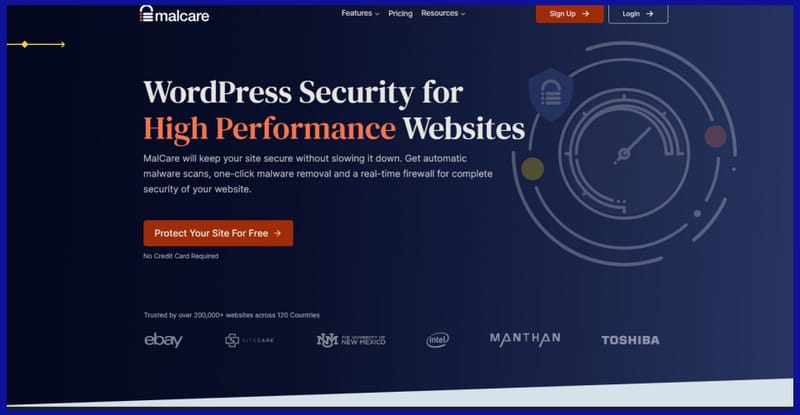
MalCare is a robust security plugin tailored for WordPress. It offers protection against malware, hacks, and other online threats. Founded by Akshat Choudhary and launched in 2017, MalCare aims to provide an intuitive and effective security solution for website owners.
Features:
- Malware Scanning: MalCare conducts comprehensive scans of your website's files to detect any malicious code or malware injections.
- One-Click Malware Removal: With just a single click, MalCare swiftly eliminates identified malware from your website, ensuring quick cleanup.
- Website Firewall: MalCare includes a powerful firewall that monitors and filters incoming traffic, preventing malicious requests from reaching your site.
- Login Protection: It offers features like brute-force attack protection and CAPTCHA-based login to enhance the security of your website's login page.
Cons of MalCare:
While MalCare provides robust security features, some users have noted limitations in its pricing structure, especially for larger websites or agencies managing multiple sites. Additionally, some advanced users may find the customization options somewhat restricted compared to other security plugins on the market.
Wordfence Security
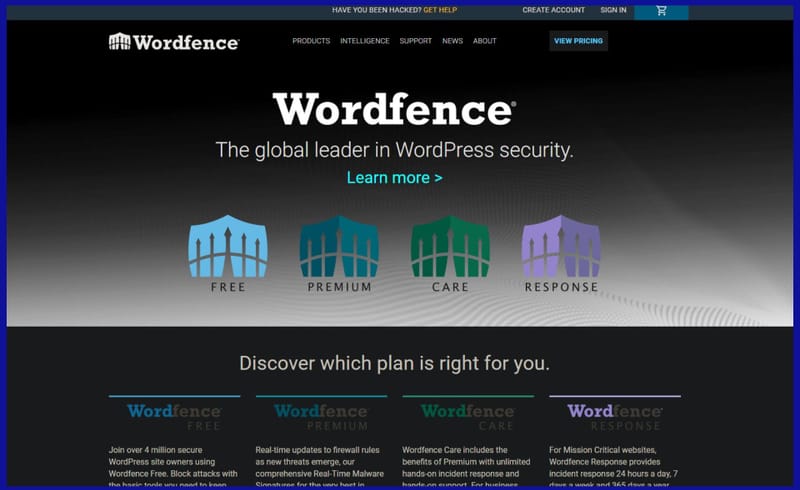
Wordfence Security is a highly regarded security plugin explicitly tailored for websites based on WordPress. It has established itself as one of the most widely used and trusted security solutions in the WordPress community. It aims to provide comprehensive protection against various online threats, including malware infections, hacking attempts, and other malicious activities.
Features of Wordfence Security:
- Malware Scanning: Wordfence conducts thorough scans of your website's files and databases to identify any signs of malware or malicious code. It employs advanced scanning algorithms to detect even the most elusive threats, ensuring the security of your website.
- Firewall Protection: One of Wordfence's standout features is its firewall, which acts as a barrier between your website and potential attackers. The firewall analyzes incoming traffic in real time, blocking suspicious requests and protecting your site from unauthorized access and exploitation.
- Login Security: Wordfence offers robust security features to safeguard your website's login page against brute-force attacks and password-guessing attempts. It allows you to enforce strong password policies, enable two-factor authentication, and limit login attempts to prevent unauthorized access.
- Real-time Threat Defense: With Wordfence's real-time threat defense mechanism, your website is constantly monitored for emerging threats and vulnerabilities. It provides instant alerts and notifications about potential security issues, allowing you to take immediate action to mitigate risks and protect your site.
- Monitoring and Management Tools: Wordfence includes a suite of monitoring and management tools that enable you to stay informed about your website's security status and take proactive measures to enhance its security posture. From security audits and activity logs to detailed reports and configuration options, Wordfence empowers you to manage the security of your website effectively.
Unlike other WordPress plugins, this one has a free version. This means you don't need to shell out money without knowing if you like the plugin or not. In my personal use, this has to be one of the best WordPress plugin.
Sucuri Security
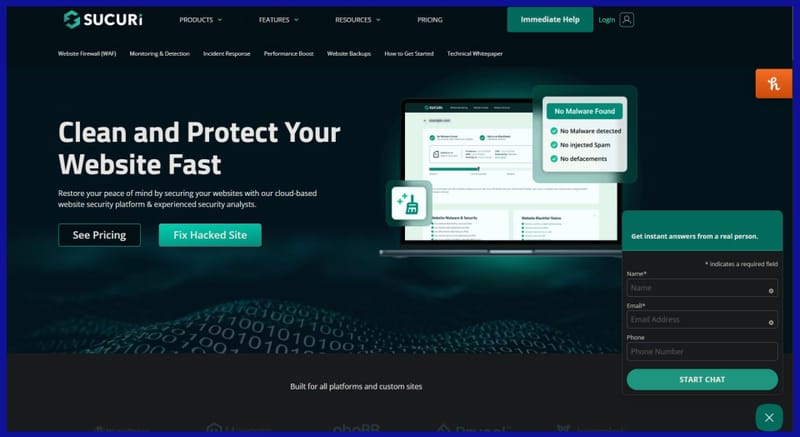
Sucuri Security is a reputable security plugin renowned for its robust website firewall, designed to provide proactive protection against various online threats to websites. Founded by Daniel Cid in 2010, Sucuri has become a trusted name in security, offering a comprehensive suite of features to ensure the safety and integrity of your online presence.
Features:
- Website Firewall: Sucuri's website firewall acts as a powerful shield for your website, intercepting and filtering malicious traffic before it can reach your site. By blocking malicious requests and potential attacks at the edge of your network, the firewall helps prevent unauthorized access and keeps your site safe from exploitation.
- Malware Scanning: Sucuri Security includes malware scanning capabilities to detect and remove any malicious code or malware infections present on your website. The scanning process is thorough and efficient, enabling you to identify and eliminate threats quickly to prevent further damage to your site's reputation and performance.
- Security Hardening: Sucuri offers security hardening features to strengthen your website's overall security posture. This includes implementing best practices for WordPress security, such as securing file permissions, disabling unnecessary features, and hardening the WordPress core to minimize vulnerabilities and reduce the risk of exploitation.
- Incident Response Services: In addition to proactive security measures, Sucuri provides incident response services to assist you in the event of a breach or attack. Their team of security experts offers timely assistance and guidance to help you recover from security incidents and restore your website to a secure state.
Overall, Sucuri Security combines advanced firewall protection, malware scanning, security hardening, and incident response services to keep your website safe from online threats. With Sucuri, you can have peace of mind knowing that your website is in good hands and well-protected against potential security risks.
Solid Security (Formerly iThemes Security)
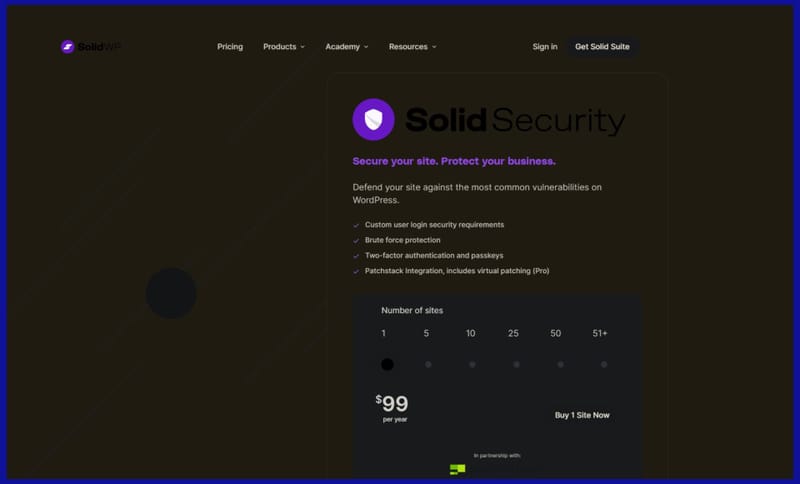
Solid Security, formerly known as iThemes Security Pro, is a robust security plugin designed to fortify websites against a wide range of threats. Founded by Cory Miller and launched in 2011, iThemes Security has earned a reputation for its comprehensive suite of features aimed at enhancing the security posture of WordPress sites.
Features:
- Brute-Force Attack Protection: iThemes Security offers protection against brute-force attacks by limiting the number of login attempts and implementing CAPTCHA-based authentication to thwart automated login attempts by malicious actors.
- File Integrity Checking: With file integrity checking, Solid Security monitors the core files of your WordPress installation for any unauthorized modifications or changes. This helps detect and alert you to potential breaches or malware infections.
- 404 Detection: iThemes Security includes 404 detection functionality to identify and log any 404 errors encountered on your website. This can help uncover attempts to access non-existent pages or resources, which may indicate probing or reconnaissance by attackers.
- Vigorous Password Enforcement: iThemes Security enables you to enforce strong password policies for user accounts on your WordPress site, reducing the risk of compromised credentials and unauthorized access. It encourages the use of complex passwords and prompts users to update weak or insecure passwords.
- Security Logs and Notifications: Solid Security keeps you informed about potential security concerns through comprehensive security logs and notifications. It logs security-related events and activities, such as failed login attempts, file changes, and plugin updates. It sends alerts to notify you of any suspicious or unauthorized activity on your website.
In summary, Solid Security provides a robust set of security features designed to safeguard websites against common security risks and vulnerabilities. By offering protection against brute-force attacks, file integrity checking, 404 detection, vigorous password enforcement, and security logs with notifications; Solid Security helps you proactively defend your website and maintain its integrity and security.
Installing and activating a WordPress security plugin
Installing and activating a WordPress security plugin is a straightforward process:
- Begin with logging into your WordPress dashboard.
- Once logged in, navigate to the "Plugins" section and click on "Add New."
- In the search bar, enter the name of the security plugin you wish to install.
- Once the plugin appears in the search results, click on "Install Now" and then "Activate" to activate the plugin.
After activation, you may need to navigate to the plugin's settings page to configure its options according to your preferences. Some security plugins may prompt you to run a setup wizard or perform a security scan upon activation to ensure the security of your website.
Configuring the settings of your WordPress security plugin is a pivotal step in taking charge of the security of your website. Start by reviewing the plugin's general settings, which usually include options for activating or deactivating specific security features, such as malware scanning, firewall protection, and security.
Then, set up any advanced settings or custom rules based on your website's unique security needs. Give special attention to settings related to file integrity monitoring, database security, and notification preferences to ensure all-around protection against potential threats.
Lastly, consider enabling automatic updates for the plugin to ensure you're always equipped with the latest security patches and feature enhancements.
Once you've installed and configured your WordPress security plugin, it's crucial to stay on top of regular maintenance and monitoring. This proactive approach ensures the ongoing effectiveness of your security.
Set a schedule for regular security scans and audits to catch and address any potential security vulnerabilities or issues promptly. Stay updated on security best practices and emerging threats by following reputable security blogs and forums.
Keep an eye on your website's activity logs and security alerts for any signs of suspicious activity or unauthorized access attempts. Lastly, keep your security plugin and WP core, themes, and plugins up to date to stay ahead of evolving threats. Regular maintenance and monitoring are the keys to a secure website.
Advanced Security Strategies
While security plugins provide essential protection, you can further secure your WordPress. Website owners should implement additional security to enhance their website's resilience against cyber threats. This includes regular security audits to identify vulnerabilities and weaknesses in the website's infrastructure.
Additionally, implementing a web application firewall (WAF) can help filter out malicious traffic and protect against common attack vectors such as SQL injection and cross-site scripting (XSS).
Furthermore, website owners should consider implementing security headers, such as Content Security Policy (CSP) and X-Frame Options, to mitigate the risk of cross-site scripting and clickjacking attacks. By adopting such preventive measures, website owners can strengthen the security of their websites and minimize the risk of breaches.
Implementing HTTPS encryption is a crucial security that helps protect data transmitted between the website and users' browsers from interception and tampering. By encrypting data with HTTPS, website owners can ensure the confidentiality and integrity of sensitive information.
Additionally, using strong, unique passwords for user accounts and administrative access helps prevent unauthorized access and brute force attacks. Furthermore, restricting file permissions on WordPress directories and files ensures that only authorized users can access and modify critical website components. By adopting these techniques, website owners can mitigate common security risks and fortify their website's defenses against potential threats.
Securing themes, plugins, and the WordPress database is essential for maintaining a website's overall security. Website owners should regularly update themes and plugins to patch known vulnerabilities and ensure compatibility with the latest WordPress version.
Additionally, conducting regular security audits of themes and plugins helps identify and remove potentially malicious code or vulnerabilities. Furthermore, implementing database security best practices, such as using unique table prefixes, restricting database access, and regularly backing up database files, helps protect sensitive data stored in the WordPress database.
By securing themes, plugins, and the WordPress database, website owners can minimize the risk of breaches and ensure the integrity of their website's content and functionality.
Best Practices for WordPress Security
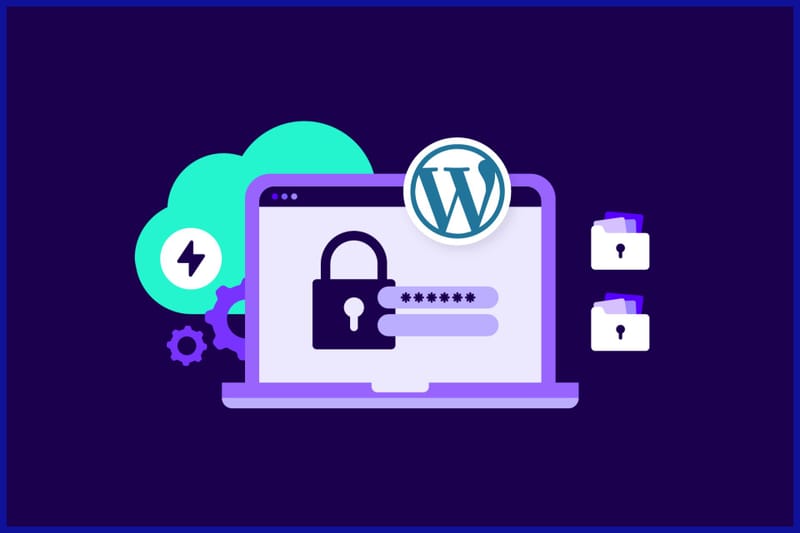
Maintaining a secure website involves implementing a combination of proactive measures and adhering to best practices. These include:
- Regularly update WordPress core, themes, and plugins to patch known vulnerabilities.
- Use strong, unique passwords for user accounts to prevent unauthorized access.
- Implement security plugins and firewalls to protect against common threats.
- Conduct regular security audits to identify and address potential security risks.
- Perform backups of your website's files and database on a regular basis.
- Monitor website activity for suspicious behavior and unauthorized access attempts.
- Educate users about security best practices, including recognizing phishing attempts and avoiding suspicious links or downloads.
Regular backups, software updates, and security audits are fundamental practices for maintaining the security of your website.
Regularly backing up your website's files and database ensures that you can restore your website to a previous state in the event of a security incident or data loss. Additionally, keeping themes and plugins updated with the latest security patches helps prevent vulnerabilities from being exploited by attackers.
Finally, conducting regular security audits of your website's infrastructure and configurations helps identify and address potential security risks before they can be exploited.
User education and awareness play a crucial role in maintaining security. Educating users about best practices for creating and managing secure passwords, recognizing phishing attempts, and avoiding suspicious links or downloads helps mitigate the risk of user-related security incidents, such as account compromises or malware infections.
Additionally, raising awareness about the importance of regular software updates, backups, and security audits encourages users to actively participate in maintaining the security of the website. By fostering a culture of security awareness among users, website owners can enhance the overall security posture of their websites and reduce the likelihood of breaches.
Summing It Up
Throughout this comprehensive guide, I've explored the critical aspects of WordPress security, including common vulnerabilities, consequences of breaches, and proactive measures.
I've discussed the role of plugins in enhancing the security of your website and guided installation, configuration, and maintenance. By following best practices such as regular updates, backups, and user education, you can effectively safeguard against potential threats.
The security of your website is paramount, given the platform's popularity and susceptibility to cyber threats. Prioritizing measures, such as implementing strong passwords, regular updates, and security audits, is essential for protecting sensitive data, maintaining website integrity, and preserving user trust.
Plugins play a vital role in fortification against evolving cyber threats. By offering features such as malware scanning and firewall protection, these plugins provide an additional layer of defense. Incorporating security plugins is crucial for mitigating risks and ensuring robust protection.
FAQs
1. Do I really need a security plugin for WordPress?
Yes, you definitely need plugins for security. Security, of any form, is good to have. While WordPress itself is secure, adding a security plugin can provide extra layers of protection against common threats like malware, brute force attacks, and unauthorized access attempts. These plugins have features like firewall protection, malware scanning, and preventive measures for login, which can enhance your website's overall security posture. If you need more confidence in managing preventive measures manually, a security plugin can offer peace of mind and save you time in maintaining the security of your website.
2. Which is better, Wordfence or Sucuri?
Choosing between Wordfence and Sucuri is quite tough. Both are reputable plugins with robust feature sets and large user bases. Wordfence is known for its security scanning capabilities and real-time threat defense. At the same time, Sucuri offers a broader range of security services beyond plugin functionality, including website cleanup and DDoS protection. To determine which is better for you, consider factors like features, performance, ease of use, and customer support. Personally, Wordfence has been a better experience for me.
3. Which is better, BulletProof Security Pro or Wordfence?
Deciding between BulletProof Security and Wordfence depends on your specific security needs and preferences. BulletProof Security Pro focuses on website hardening measures and firewall protection, while Wordfence offers a broader range of security features, including malware scanning and real-time threat defense. To determine which is better suited for your website, evaluate the features, performance, and user reviews of each plugin. Consider factors like ease of use, compatibility with your website setup, and the level of support provided by each plugin's developers.

